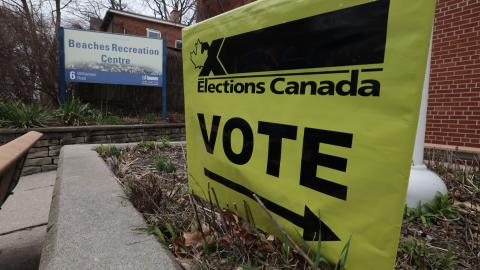Unusually, the major issue in Canada's April 28 federal election is not domestic politics per se but how the country — by far America's most important strategic and economic partner — will stand up to Donald Trump. The parties compete on who is the most anti-Trump, and this has boosted the Liberal Party against the hitherto ascendent Conservatives.
Canadians are roused by the U.S. president's musings on Canada as America's 51st state and driven apoplectic by his imposition of tariffs on the country. They are selling American vacation homes and some 36% of Canadians with U.S. travel plans say they’ve already canceled them.
There is a petition in Parliament to revoke the citizenship of Elon Musk's, whose mother is from Saskatchewan. Canada's most influential English-language newspaper headlined, “Rage is the new Canadian mood. And there’s a strong case for staying good and mad.”
Canucks have a partially deserved reputation for being polite and non-confrontational — at least outside of hockey rinks. These neighbors share the world's longest international border, one that has long been very peaceful. I remember crossing the border to go shopping, or even just for dinner.
But anti-American currents lie deep in English-Canadian relations, including its religious history.
The American War of Independence created not one country but two. The “United Empire Loyalists,” who opposed the revolutionary war, migrated or else fled north when they were attacked. Between 80,000 and 100,000 people moved, about half to the then British North America, though some later returned.
They included several thousand Native Americans, mainly drawn from the Iroquois Nations, especially Mohawk, Seneca, Onondaga, and Cayuga. They remained loyal to Great Britain, with whom they had had stronger relations and already established treaty rights and obligations. There were also several thousand Black Loyalists, though they often had a difficult time.
It would be an exaggeration to see all or perhaps most of these migrants as driven solely by commitment to Crown and Church. The British gave financial incentives to the new settlers and, hard to believe now, taxes were much lower north of the border. But, while there were pecuniary factors, many Loyalists did sincerely reject a more individualist republic, and were loyal to the Anglican church.
The influx of Loyalists changed the demography of British North America, which hitherto had been largely French speaking. By the War of 1812, of the 110,000 inhabitants of Upper Canada (now Ontario), some 20,000 were initial Loyalists and 60,000 were later American immigrants and their descendants. Almost three quarters of the inhabitants of Upper Canada were people who had left the U.S. or were the children of those who had.
English Canada was shaped in large part by people who had rejected America.
Such longer-term Loyalist influences are still evident. The coat of arms of Canada's dominant province, Ontario, carries the words Ut incepit fidelis sic permanet (“Loyal she began, loyal she remains”); New Brunswick has Spem Reduxit(“Hope restored”). They provided the foundation for a distinct country in North America. In place of the America's “Life, Liberty and the Pursuit of Happiness” it emphasized “Peace, Order and Good Government,” a phrase that appears throughout Canadian law and politics, including in the 1867 Constitution Act.
John Strachan, the first Anglican Bishop of Toronto and founder of the University of Toronto, and who shaped a generation of politicians, believed “the two great experiments in America and France to constitute governments productive of virtues and happiness only ... have completely failed.” He wanted “an ordered society, an established church, the prerogative of the crown, and prescriptive rights.” Many Americans might dismiss these claims as antediluvian rants, but Strachan saw the 1812 American invasion as an attempt to extend slavery that would also jeopardize Canada's indigenous people, who he regarded as brothers.
In 1848, Thomas D’Arcy McGee escaped arrest for his fight against British rule in Ireland by fleeing to America. There his political views changed, in particular he began to reject what he saw as an American overemphasis on individual freedom. In 1857, he moved to Canada and sought to persuade Irish Catholics to cooperate with the Protestant British to resist American influence. He stressed that:
“Where the fault lies ab origine in the American constitutions, it is not hard to say. Their authors were so busy looking after their newfound liberty that they forgot that they too, could not long govern without authority. … They could not assert the divine origin of government, the natural right of man to be governed, the virtue of civil obedience, and all the other ethical truths.”
He became a major figure in the creation of Canadian Confederation in 1867 but shortly after was assassinated in Ottawa by an Irish nationalist.
In 1905, Sir Wilfrid Laurier, Canada's first Catholic and French-Canadian Prime Minister, declared:
"We live by the side of a nation in whose schools, for fear that Christian dogmas in which all do not believe might be taught, Christian morals are not taught…. when I observe in this country of ours, a total absence of lynchings and an almost total absence of divorces and murders, I thank heaven that we are living in a country where the young children of the land are taught Christian morals and Christian dogmas."
This historic Canadian sensibility was summarized by the late Canadian philosopher George Grant:
“It was an inchoate desire to build, in these cold and forbidding regions, a society with a greater sense of order and restraint than freedom-loving republicans would allow. It was no better defined than a kind of suspicion that we in Canada could be less lawless and have a greater sense of propriety than the United States.”
Canada is now a very secular country, but Trump's asseverations have re-awakened these currents and revived memories of 19th century American moves to annex Canada. This renewed animosity is unlikely to end soon.


















